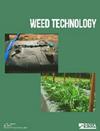Effects of paraquat application at cover crop planting on cover crop biomass and weed suppression
IF 1.7
3区 农林科学
Q3 AGRONOMY
引用次数: 0
Abstract
Successful cover crop (CC) establishment in the fall is important to maximize CC production, which is critical for achieving many objectives of CCs. Competition from winter weeds may reduce CC establishment and biomass production. A preplant herbicide, such as paraquat, at the time of CC planting in the fall will reduce winter weed pressure resulting in better establishment and growth. An experiment was conducted between 2019-2021 to test this hypothesis by evaluating a no CC check, cereal rye, hairy vetch, crimson clover, and cereal rye + hairy vetch drilled with and without paraquat applied at planting (mid-October to mid-November) following either a corn or soybean crop. Visible weed suppression ratings were collected in mid-April and total CC and weed biomass was collected in late April. More CC biomass was accumulated following corn than soybean, regardless of preplant herbicide application because corn is typically harvested before soybeans. Therefore, CC should be planted early to accumulate more biomass. Weed suppression varied by weed species from all factors, but in general weed suppression was best from CC mixture containing cereal rye and paraquat applied at planting. If weed suppression is the main goal of the CC, then a preplant herbicide at CC planting is recommended. However, if CC weed suppression goals can be achieved through biomass accumulation, no preplant herbicide is needed. This information is useful for producers to achieve various CC objectives while managing costs.施用百草枯对覆盖作物生物量和杂草抑制的影响
秋季成功建立覆盖作物(CC)对最大限度地提高CC产量至关重要,这对实现CC的许多目标至关重要。来自冬季杂草的竞争可能会降低CC的建立和生物量的生产。在秋季CC种植时,预植除草剂,如百草枯,将降低冬季杂草的压力,从而更好地建立和生长。2019-2021年期间进行了一项实验,通过评估在玉米或大豆作物种植时(10月中旬至11月中旬)使用和不使用百草枯的无CC检查、谷类黑麦、毛豌豆、深红色三叶草和谷类黑麦+毛豌豆来验证这一假设。4月中旬收集了可见的杂草抑制评级,4月下旬收集了总CC和杂草生物量。玉米后积累的CC生物量比大豆多,无论种植前施用除草剂,因为玉米通常在大豆前收获。因此,CC应尽早种植,以积累更多的生物量。杂草的抑制作用因杂草种类而异,但总的来说,种植时使用含有黑麦和百草枯的CC混合物对杂草的抑制效果最好。如果杂草抑制是CC的主要目标,那么建议在CC种植时使用预植除草剂。然而,如果CC杂草的抑制目标可以通过生物量的积累来实现,则不需要预植除草剂。这些信息有助于生产商在管理成本的同时实现各种CC目标。
本文章由计算机程序翻译,如有差异,请以英文原文为准。
求助全文
约1分钟内获得全文
求助全文
来源期刊

Weed Technology
农林科学-农艺学
CiteScore
2.90
自引率
21.40%
发文量
89
审稿时长
12-24 weeks
期刊介绍:
Weed Technology publishes original research and scholarship in the form of peer-reviewed articles focused on understanding how weeds are managed.
The journal focuses on:
- Applied aspects concerning the management of weeds in agricultural systems
- Herbicides used to manage undesired vegetation, weed biology and control
- Weed/crop management systems
- Reports of new weed problems
-New technologies for weed management and special articles emphasizing technology transfer to improve weed control
-Articles dealing with plant growth regulators and management of undesired plant growth may also be accepted, provided there is clear relevance to weed science technology, e.g., turfgrass or woody plant management along rights-of-way, vegetation management in forest, aquatic, or other non-crop situations.
-Surveys, education, and extension topics related to weeds will also be considered
 求助内容:
求助内容: 应助结果提醒方式:
应助结果提醒方式:


